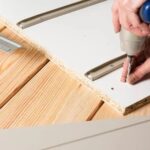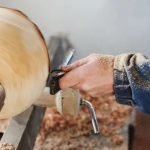Safety Tips
When working with wood and respirators, it is important to follow safety protocols to avoid any accidents or respiratory issues. First, provide proper ventilation in the area you are working in by keeping windows and doors open when possible. While doing this, always wear safety glasses or a face shield to protect your eyes from sawdust and other small particles while using power tools. Additionally, always ensure your work area is clean and clutter-free when working with wood as not being able to see potential hazards can lead to injury. Additionally, if there is a large build up of sawdust on the ground that needs some form of extraction, you should install a vacuum cleaner at your workstation so that the dust will be sucked away automatically. Finally, make sure that you are wearing a good respirator that fits securely and protects you against any kind of hazardous airborne particles in your workspace.
Research
When it comes to woodworking, there are numerous risks that can be associated with inhalation of dust and airborne particles. Research has consistently demonstrated the potential for both short-term and long-term health effects from exposure to these particles, including respiratory diseases, eye irritation, allergies, neurological effects, and disruption of the immune system. Therefore, wearing a properly fitting respirator is essential for anyone engaging in woodworking or any other activity that may involve the inhalation of airborne particles.
In order to find a good respirator for woodworking, there are several factors that need to be taken into account. First, you should look at the type of protection offered by the respirator. There are two types of respirators: air-purifying and atmospheric supplied air (ASA). Air-purifying respirators rely on filters to trap particles before they’re breathed in; whereas ASA devices provide clean air from an external source. In addition to this, it’s important to consider whether the respirator fits comfortably on your face while providing an adequate seal against incoming dust. This can be assessed by attending a proper fitting session and asking an expert opinion where necessary. Lastly, there should also be consideration given to how often the filter needs replacing or if it can be cleaned without replacing it completely each time you use it.
Benefits
Using a respirator while woodworking offers a number of benefits. First, it helps keep dust and debris away from your mouth and nose, serving as a physical barrier between you and any potential airborne contaminants – this is especially useful when engaging in finer tasks where particles can become easily airborne. In addition, wearing a respirator can help enhance your concentration, providing an improved work experience by helping to block out exterior noise that may otherwise be distracting.
Perhaps one of the greatest advantages of using a respirator in woodworking is the ability it offers to achieve more precision with fewer sanding cycles. By collecting all the dust generated during the sanding process, instead of allowing it to become airborne by spreading around the room, the respirator leaves everything cleaner; this lets you carry out finer tasks with more accuracy and often takes less time than having to go back and do extra rounds of sanding after dust has settled on adjacent surfaces or affected layers.
Reviews
When you are looking for the best respirator for woodworking, it is important to understand the features of different models. Reviews of respirators designed specifically for woodworking can be a great way to help inform your decision. By reading reviews, you can learn more about the types of respirators available on the market, as well as how they compare in terms of comfort, fit, durability and budget.
You should also consider what kind of environment you’ll be working in when choosing a respirator. If you are working with chemicals or materials that produce toxic dusts or particles, then you will need to buy a respirator with this level of protection. It’s also important to check that the filters are replaceable and adjustable so that it is possible to customize the breathing capacity for different projects. Some models also include anti-fog eye protectors and flame retardant designs which can provide additional safety benefits when working with hot objects such as saw blades and drill bits.
Durability is another factor when choosing a good respirator for woodworking – it should have enough materials and mechanisms to last throughout different jobs without having to purchase multiple sets over time. Cost is also an essential component – compare prices between the different models available before making a final decision. A good review can reveal valuable information about price versus value for different types of respirators designed for woodworking. Finally, look at related information about warranty policies as this could be an expensive purchase if it breaks after minimal use and lack of extensive coverage on repairs or replacements.
Cost
When it comes to buying a respirator for woodworking, cost is an important factor to consider. Every professional or hobbyist needs to purchase an effective and reliable respirator that meets their particular needs without breaking the bank. There are many quality respirators available on the market at different price points, so finding an appropriate one is possible.
If you are looking for the most cost-effective option, then disposable respirators may be your best bet. These single-use devices provide basic protection against organic vapors and non-toxic dusts and are predominately used in non-hazardous environments. Additionally, when it comes to disposables, look into buying larger quantities of them at once as this usually reduces the overall cost per unit significantly.
On the other hand, if you require more comprehensive protection due to hazardous particles, liquid splashes or work in dusty/dirty conditions then reusable respirators might be your best choice. These are designed for multiple uses and feature replaceable filter cartridges ensuring its effectiveness is maintained throughout its lifetime. For longer-term use, these types of respirators can represent considerable savings over purchasing durable disposables continuously. However more expensive upfront than disposable versions they offer superior breathing comfort and improved durability making them more economical over time; especially if you will be using them frequently.

Hi everyone! I’m a woodworker and blogger, and this is my woodworking blog. In my blog, I share tips and tricks for woodworkers of all skill levels, as well as project ideas that you can try yourself.





